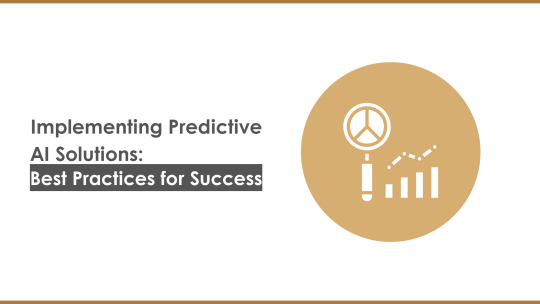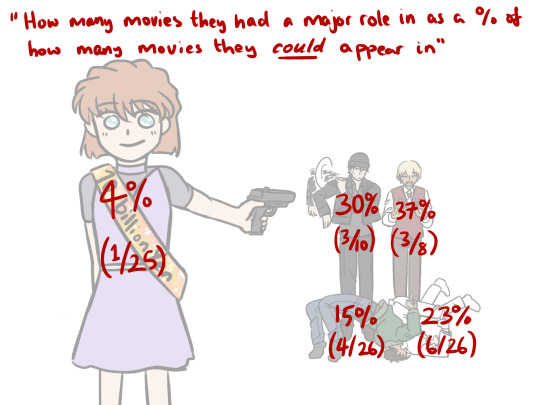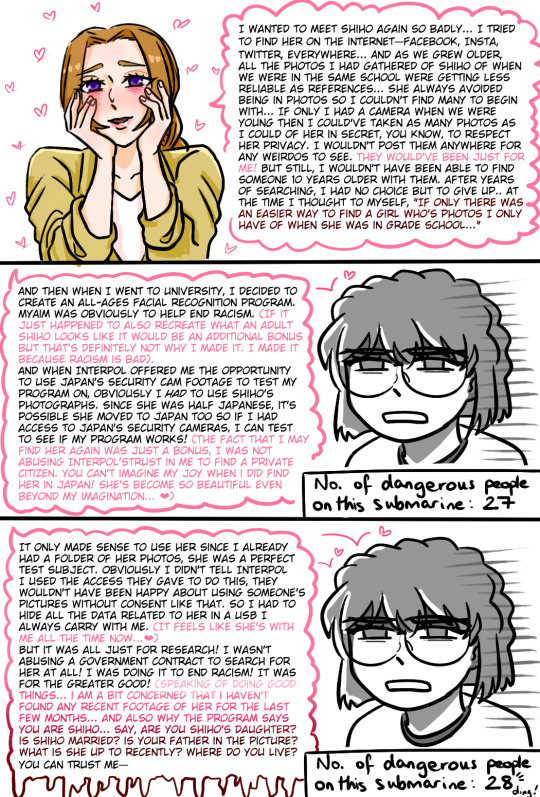#predictive AI
Explore tagged Tumblr posts
Text
Behold, the torment nexus, from award winning book, "Don't make the torment nexus"
#distopia#ai ethics#ai#crime#predictive ai#policing#acab1312#so this is just racial profiling right#the pattern matcher matches patterns#as my cs prof always said#garbage in garbage out
2 notes
·
View notes
Text
Illuminating the Future: A Comparative Journey through Generative AI and Predictive AI.
Sanjay Kumar Mohindroo Sanjay Kumar Mohindroo. skm.stayingalive.in Explore the evolution of Generative and Predictive AI in a captivating journey of history, innovation, and visionary intellect. A Journey Through Time and Technology In the ever-evolving realm of artificial intelligence, two approaches stand as towering pillars of innovation: Generative AI and Predictive AI. Their emergence…
#AI History#AI Pioneers#Artificial intelligence#digital transformation#Generative AI#Generative Creativity#Innovation#Machine Learning#News#Predictive AI#Predictive Maintenance#Sanjay Kumar Mohindroo#Tech Evolution
0 notes
Text

Get the advantage of predictive analytics for your business. Visit this page of Langoor AI: https://langoor.ai/predictive-ai/
0 notes
Text
Beyond Omnichannel: Why 2025 Demands a New Playbook for Customer Service
Social network connection icon illustration For years, we’ve talked about omnichannel like it���s the holy grail of customer service. And a decade ago, it was. Bringing together call centers, chatbots, and emails into one seamless experience? That was groundbreaking. But today, it’s the bare minimum. Customers don’t just expect seamless—they demand intuitive. As we step into 2025, the winners in…

View On WordPress
0 notes
Text
Predictive AI Driving Efficiency and Growth
Predictive AI is transforming industries by driving efficiency and fostering growth. By leveraging advanced algorithms, machine learning, and real-time data analysis, businesses can anticipate trends, optimize operations, and make precise decisions. This cutting-edge technology identifies patterns and predicts outcomes, helping organizations seize opportunities and mitigate risks before they arise. From improving customer experiences to streamlining supply chains and enhancing resource management, Predictive AI empowers companies to achieve sustainable growth in a competitive landscape. Explore how Predictive AI is reshaping industries, enabling smarter strategies, and unlocking the potential for innovation and success in the modern world.
0 notes
Text
Implementing Predictive AI Solutions: Best Practices for Success

Predictive AI Solutions offer immense potential for businesses to enhance decision-making, optimize operations, and drive growth. However, the successful implementation of these solutions requires careful planning, strategic execution, and adherence to best practices. Predictive AI Solutions can transform your business, but to maximize their benefits and ensure a smooth integration, it’s essential to follow key best practices. This blog outlines the best practices for implementing Predictive AI Solutions, ensuring that your business reaps the full rewards of AI-driven insights.
1. Define Clear Objectives
Before diving into the implementation of Predictive AI Solutions, it’s crucial to define clear and specific objectives. Understanding what you aim to achieve with AI will guide the entire implementation process and ensure that the solutions are aligned with your business goals.
Action Steps:
Identify the key business challenges you want to address with AI, such as improving sales forecasting, enhancing customer experience, or optimizing inventory management.
Set measurable goals that define success, such as a specific percentage increase in sales or a reduction in operational costs.
Communicate these objectives clearly to all stakeholders involved in the implementation process.
2. Ensure High-Quality Data
Predictive AI relies heavily on data. The accuracy and reliability of AI predictions are directly tied to the quality of the data used. Ensuring that your data is clean, relevant, and well-organized is paramount for the success of your AI initiatives.
Action Steps:
Conduct a thorough data audit to identify and rectify any inconsistencies, inaccuracies, or missing values.
Integrate data from multiple sources to provide a comprehensive view, ensuring that the AI models have access to all relevant information.
Implement robust data governance practices to maintain data quality and integrity over time.
3. Choose the Right AI Tools and Platforms
Selecting the appropriate AI tools and platforms is critical for the successful implementation of Predictive AI Solutions. The tools you choose should align with your business needs, technical requirements, and scalability goals.
Action Steps:
Evaluate different AI platforms based on their features, ease of integration, scalability, and support for predictive analytics.
Consider factors such as user-friendliness, customization options, and compatibility with your existing IT infrastructure.
Collaborate with AI consultants or service providers to identify the best tools that meet your specific requirements.
4. Build a Skilled Team
Implementing Predictive AI Solutions requires a combination of technical expertise, domain knowledge, and analytical skills. Building a skilled team is essential for the successful deployment and management of AI initiatives.
Action Steps:
Hire or train data scientists, machine learning engineers, and analysts who have experience with predictive analytics and AI technologies.
Foster a collaborative environment where team members can work together to develop, test, and refine AI models.
Encourage continuous learning and professional development to keep the team updated with the latest AI advancements and best practices.
5. Start with Pilot Projects
Launching a pilot project is an effective way to test the feasibility and effectiveness of Predictive AI Solutions before committing to a full-scale implementation. Pilots help identify potential challenges, refine strategies, and demonstrate the value of AI to stakeholders.
Action Steps:
Select a specific area or business function to pilot the AI solution, such as sales forecasting or customer segmentation.
Define clear metrics to evaluate the success of the pilot, such as accuracy of predictions, time saved, or improvement in key performance indicators (KPIs).
Analyze the pilot results, gather feedback, and make necessary adjustments to optimize the AI models and implementation approach.
6. Integrate AI with Existing Systems
For Predictive AI Solutions to be effective, they must be seamlessly integrated with your existing IT infrastructure and business processes. Integration ensures that AI-generated insights are accessible and actionable across the organization.
Action Steps:
Work with IT teams and AI consultants to ensure compatibility between AI tools and your existing systems, such as CRM, ERP, and data warehouses.
Develop APIs or use middleware to facilitate data flow and integration between different platforms.
Ensure that AI insights are easily accessible to relevant teams through dashboards, reports, and automated alerts.
7. Focus on User Adoption and Training
The success of Predictive AI Solutions depends not only on the technology but also on how well it is adopted by users within the organization. Providing adequate training and fostering a culture of data-driven decision-making are essential for maximizing the benefits of AI.
Action Steps:
Conduct comprehensive training sessions to educate employees on how to use AI tools and interpret AI-generated insights.
Encourage a data-driven culture where decisions are based on analytical insights rather than intuition alone.
Provide ongoing support and resources to help users navigate challenges and fully leverage AI capabilities.
8. Monitor and Optimize Continuously
Implementing Predictive AI Solutions is not a one-time effort; it requires continuous monitoring and optimization to ensure sustained success and adaptability to changing business needs.
Action Steps:
Regularly review the performance of AI models and assess their accuracy and relevance.
Gather feedback from users to identify areas for improvement and make necessary adjustments to the AI solutions.
Stay updated with the latest AI advancements and incorporate new technologies and methodologies to enhance the effectiveness of your Predictive AI Solutions.
9. Ensure Ethical AI Practices
As businesses increasingly rely on AI for critical decision-making, ensuring ethical AI practices becomes essential. This includes addressing issues such as bias, transparency, and accountability in AI models.
Action Steps:
Implement bias detection and mitigation techniques to ensure that AI predictions are fair and unbiased.
Maintain transparency by documenting AI model decisions and making them understandable to stakeholders.
Establish accountability frameworks to ensure responsible use of AI and adherence to ethical standards.
Conclusion
Implementing Predictive AI Solutions can significantly transform your business, driving growth, efficiency, and innovation. By following these best practices—defining clear objectives, ensuring data quality, choosing the right tools, building a skilled team, starting with pilots, integrating with existing systems, focusing on user adoption, continuously monitoring and optimizing, and ensuring ethical AI practices—you can maximize the benefits of AI and achieve sustainable success. Embrace Predictive AI Solutions to unlock the full potential of your data and stay ahead in a competitive market.
0 notes
Text
Intelligent Predictive AI is an innovative tool that can improve time management by providing new methods and knowledge for better human scheduling.
#Predictive AI#Daily Tasks#Time Management#Time-Saving Solutions#Boost Productivity#Boost Productivity with Predictive AI
0 notes
Text
The Age of the Digital Precog: How AI Predicts Our Every Move
Just like the precogs could glimpse future events, AI sifts through enormous amounts of data to make informed guesses about what we’ll do next.
Whats On My Mind Today? Who Are You? How to passively gather personal information is a fascinating look into how businesses, marketers, and tech giants employ techniques to connect your protected data to the information you freely share. Passive information gathering means collecting data about a person without actively seeking it or requiring direct interaction. This can happen through…
#AI data gathering#ChatGPT#data transparency#digital privacy#digital surveillance#IoT privacy#MidJourney#passive data collection#personal privacy#predictive AI#public records#social media analysis#synthetic data
0 notes
Text
That’s because there are types of AI.
Hating AI is completely valid, and more people should be against it… when it is generative AI. Generative AI is probably what most of the people on here are familiar with. Simply put, it’s when we feed the machine material and it spits out mangled, recycled parts. Because of its accessibility, and how cheap it is, generative AI is single-handedly killing the entire media industry. Why would anybody pay a team of people when they could just use generative AI for “good enough” quality? I am less familiar with large language models, how it works, or its applications. I don’t know if it’s “bad” because people half ass training them, or if it’s because of the limitations on how it works on a fundamental level. So I can’t really speak on that one. However, I do believe that it is similar to generative AI that upper management is trying to get away with not paying people by using it instead.
If I remember correctly, Predictive AI is what has had the biggest impact on healthcare. It’s is taught to recognize patterns and can make predictions based off those preexisting based off them. So if you train them, you get things that can identify different types of pastries that can be retrained to identify cancer cells.
Which is real actual story, by the way. One of my personal favorites

So, yes, AI used to make any kind of art is bad. From a base starting point, it’s inherently corrupt because its framework is made up of entirely stolen material. So it’s already in moral gray area to begin with! After using these uncredited and stolen work, you can the exact result you want with skill required of being able to type in a google search bar, all for free or incredibly cheap. Why would you hire someone when you could do it yourself in a fraction of the time? And they are!CEO’s are using these tools in order to amass more wealth, and causing an even larger wage gap. In the USA at least, we have already started to see this happening. Entire animation teams dissolved and replaced. Wizards of the Coast used AI art for their DnD books. Storyboard artists not being able to find work in years. The writers strike because people were using their work without permission. The voice actors strike because people were using their voice without permission. College graduates with a CS major not being able to find work because of the listings are just “talk to the computer and poorly train our large language model :)”. And this is all information that I simply gleaned because I follow artists and they talk about it. I haven’t even begun to look into how it might affect other jobs.
However, that isn’t to deminish that predictive AI can be life saving and revolutionary!
AI being dangerous, and AI being helpful can both be true and exist simultaneously.
Personally? I wish that they were called something other than AI. Especially Large Lange Models and Generative AI. People tend to associate them with movie AI’s and fundamentally misunderstand what they are…. It would also help the confusion. And speaking of wishing, I believe that there should be laws in place to protect the working class. LLM/generative AI needs to be more regulated. At the very least, something to make it more difficult to keep these models from using copywritten materials. Not that I see that happening any time soon, since a lot of the people in power are the ones who benefit most.
It's always so weird that like. Fully a third of job listings I see in machine learning are for biomedical research. And easily two thirds of postdocs. Massive, huge family of applications that seems completely absent from the public discourse. From the way people talk about it you'd think half the field works in image generation and nobody does medical research, but in reality only a tiny handful of people seem to be doing image generation, and everyone else is either doing language models or studying cancer and designing novel drugs
3K notes
·
View notes
Video
youtube
(AIを利用したemailマーケティングから)
0 notes
Text
#Tags:AI and Free Will#AI and Human Behavior#AI and Society#AI Dreaming#AI Ethics#AI in Economics#AI Predictions#Big Data and AI#Data Analysis#facts#Future Forecasting#life#Machine Learning#Podcast#Predictive AI#Predictive Analytics#serious#straight forward#truth#upfront#website#Post navigation
0 notes
Text
Predict the Future of Business Moves with Predictive AI
Advanced predictive AI tool from Langoor
Harness the power of advanced predictive AI tools to forecast trends, product ideation mitigate risks, and optimize operations. From predictive analytics to actionable strategies, Langoor.ai empowers businesses to stay ahead of the competition. Read use cases on how Predictive AI solutions can transform your business decisions with data-driven insights. Visit the website of Langoor to be learn more about predictive AI.
0 notes
Text






CHRISTMAS EVE, 1890 - part 3 - part 1 - part 2 - bit of a cliffhanger on this one - Watson's Sketchbook will return with THE BLUE CARBUNCLE!
(this is the Watson's Sketchbook series!)
#everyone who predicted a scene of hands being mended was correct#my love of drawing hands ensures that ai will never be able to replace me#watsons sketchbook#sherlock holmes#john watson#my art
2K notes
·
View notes
Text













watched m26 hehe, sorry for the word vomit
if anyone was wondering how i was counting how many movies they appeared in, i made a little timeline when i was trying to figure it out for myself ↓
all dcmk movies are released on golden week which is in april. shout out to the detectiveconanworld wiki i couldn't have done it without you x

the real enemy is conan because he's got a perfect 100% movie spotlight
#dcmk#detective conan#m26 spoilers#haibara ai#i'm not tagging all of them#m5 2001 -> 9/11; m26 2023 -> submarine explodes#2/26 (7.7%) means dcmk movies have predicted the future more times than ai has had a spotlight in a movie#bets on next conan movie to predict the future#hmmm i think i'm gonna make a poll for M28 brb#i don't really understand how naomi thought an all ages face recognition software would help get rid of racism...#but she went ahead and used it to find her childhood crush so i support her ❤#my art
1K notes
·
View notes
Text
I don’t have a posted DNI for a few reasons but in this case I’ll be crystal clear:
I do not want people who use AI in their whump writing (generating scenarios, generating story text, etc.) to follow me or interact with my posts. I also do not consent to any of my writing, posts, or reblogs being used as inputs or data for AI.
#not whump#whump community#ai writing#beans speaks#blog stuff#:/ stop using generative text machines that scrape data from writers to ‘make your dream scenarios’#go download some LANDSAT data and develop an AI to determine land use. use LiDAR to determine tree crown health by near infrared values.#thats a good use of AI (algorithms) that I know and respect.#using plagiarized predictive text machines is in poor taste and also damaging to the environment. be better.
275 notes
·
View notes